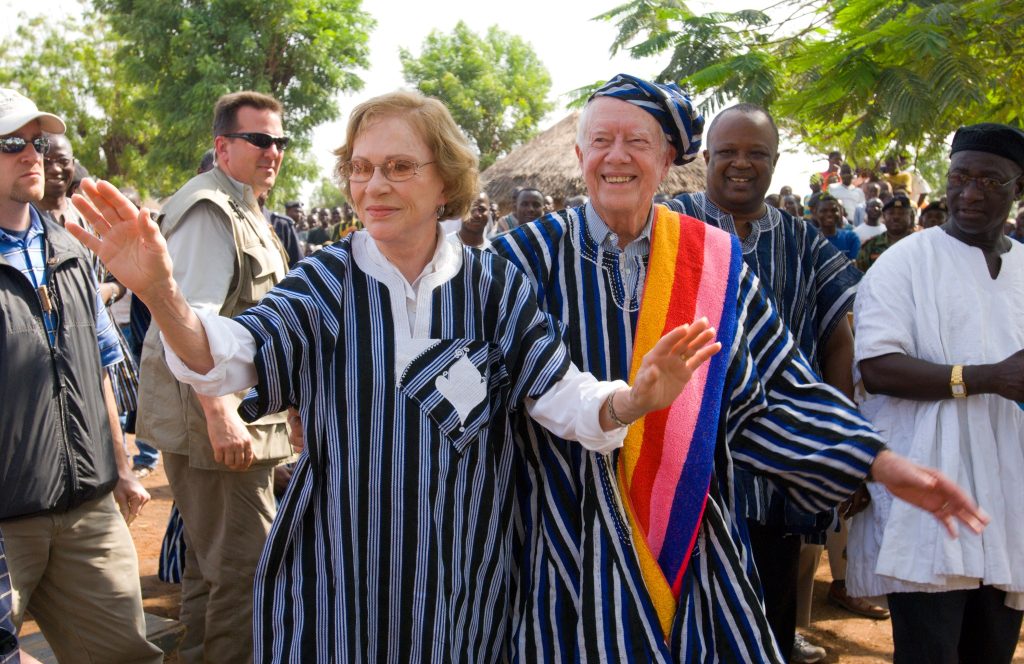A tribute by Edward Boateng
Accra, Jan 9, GNA – Lying in the Rotunda in Washington, D.C., are the final remains of one of the greatest humanitarians to have ever served as President of the United States, President Jimmy Carter.
It is with deep emotion and reverence that I reflect on the privilege of meeting him on several occasions. What impressed me the most about President Carter was not the grandeur of his title, but his unparalleled humanity, humility, and empathy for the poor and underprivileged.
I first met President Carter in 1992 while I was relatively new at Turner Broadcasting System, then owned by CNN Founder, Mr. Ted Turner. A call came from the Chairman’s Office, informing us that President Carter, General Olusegun Obasanjo, and an African entrepreneur interested in the media business would be visiting.
The purpose was to explore how telecommunications could serve as a platform for media expansion in Africa.
When the trio arrived, I was surprised to learn that the renowned entrepreneur was a Ghanaian, Richmond Aggrey, who was then operating out of Atlanta, Georgia, and Lagos, Nigeria.
At the time, he was the first African to set up a mobile telecommunications business. What left a lasting impression on me was when President Carter insisted on giving up the chair reserved for him, referring to Mr. Aggrey as the leader of their delegation.
Despite Mr. Turner’s insistence, President Carter refused to take the seat. It was an act of profound humility that left a mark on all of us in the room, especially the younger ones like myself.

My second encounter with President Carter was even more telling. In 1995, he was our special guest at the CNN World Report Conference, where he spoke about his humanitarian work in Africa, particularly in Ghana. Through the Carter Foundation and Habitat for Humanity, he was addressing housing challenges and eradicating buruli ulcer in Northern Ghana.
I was assigned to the VVIP holding room, and unlike many dignitaries who often keep to themselves, President Carter immediately approached me. He shook my hand warmly, asked where I was from, and even recalled our brief meeting three years prior. I was stunned by his memory and personal warmth.
During our conversation, he asked if I had ever been to Tamale, and when I admitted I had not, he encouraged me to visit. He spoke with such passion about his projects there that I promised I would.
True to my word, I visited Tamale on my next trip to Ghana and was inspired by the incredible work his foundation was doing. That journey became a transformative moment in my life, sparking my desire to explore every corner of my country and understand its challenges and potential.
As he spoke about his philanthropic efforts, President Carter suddenly paused and apologized. He expressed regret that he hadn’t brought the American people along as effectively during his presidency.
I was at a loss for words but reassured him, saying, “Mr. Carter, the world appreciates you. I’m sure one day, you’ll win the Nobel Peace Prize for your second term as your service to us—the poor people of the world.”
A decade or so later, when the world recognized his tireless efforts and rewarded him with the Nobel Peace Prize, I was shocked to receive a call from my senior colleague who had been in charge of the World Report programme.
She reminded me of my words and conveyed an invitation for me to participate in the celebrations at the Carter Center. President Carter had not forgotten.
Over the years, I had the privilege of visiting the Carter Center a few times, where we shared conversations—sometimes alone, sometimes with his staff, and occasionally with his late wife, Rosalynn.
She would warmly serve us food, and whenever I declined, saying I was okay, she would chuckle and say, “Edward, you need to fatten up,” gently teasing me for being so skinny back then.
From President Carter, I learned the true value of humility, the importance of service, and the power of empathy. He embodied the ideal of servant leadership, dedicating his life to uplifting those most in need.
As we bid farewell to this extraordinary man, let us carry forward his legacy of kindness, selflessness, and unwavering dedication to justice. President Jimmy Carter was more than a leader; he was a beacon of hope and humanity in a world that so often forgets the marginalized.
His light may have dimmed on this earth, but it will forever shine in the hearts of those he touched.
GNA